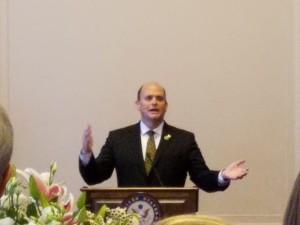On April 28, after a day educating members of Congress about the importance of the field of endocrinology and emphasizing the need for federal funding for the National Institutes of Health to support the development of new treatments for endocrine conditions, the Endocrine Society hosted a Congressional Reception on Capitol Hill to celebrate its 100th birthday.
“Democrats and Republicans can come together. We do come together, more often than what is reported in the news.”
Society president Henry Kronenberg, MD, of Massachusetts General Hospital, underscored the shortage of endocrinologists as he spoke at the reception, saying that more and more people are diagnosed with hormone disorders every year, and that we need to grow the endocrinology workforce by a rate of 14% just to approach what those workforce estimates are over the next several years. He laid some of the blame for the shortage at feet of the lack of NIH funding.
Kronenberg was joined by the co-chairs of the Congressional Diabetes Caucus, Representatives Diana DeGette (D-CO) and Tom Reed (R-NY), who spoke not only of their respective families’ experiences with diabetes, but also the challenges and opportunities of diabetes legislation.

“The Diabetes Caucus is the largest caucus in the House,” Degette says, “and we make sure to keep it that way. It’s not a hard caucus to recruit members for, because every family – whether it’s Democrat or Republican – has issues in their families.” She told the story of her daughter Francesca, who was diagnosed with type 1 diabetes (T1D) at age four, now graduating from college, whose endocrinologist is retiring this year. “I thanked her for waiting to retire,” Degette says.
Reed reiterated his personal stake in joining the Diabetes Caucus, relating the story of his son Will, telling of having to hold the boy down in the emergency room as doctors were administering insulin, praising his team of endocrinologists, and expressing his hope for a cure for diabetes. “We’re going to work together,” he says, “Diana and I, Republican and Democrat, on this issue in Washington to ensure that you do what you do best, and that is to find a cure for these diseases that impact so many of our fellow Americans.”
Degette and Reed also touched on bills they’re cosponsoring, concerning NIH funding and extending Medicare coverage of continuous glucose monitors, pointing out that this legislation will impact Americans in a positive way. “Democrats and Republicans can come together,” Reed says, “we do come together, more often than what is reported in the news.”
Photo: Navarro Copes

